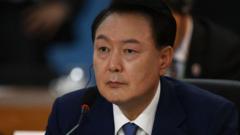South Korea is currently engulfed in a significant political crisis as the Constitutional Court commenced its impeachment trial against suspended President Yoon Suk Yeol. The court's initial hearing, lasting a mere four minutes, was marked by Yoon's absence. His legal team previously stated that attending would jeopardize his safety due to an outstanding arrest warrant on charges of insurrection.
Yoon’s suspension from office recall came in December, following a decisive vote in the National Assembly where members of his own party collaborated with the opposition to initiate impeachment proceedings. According to South Korean law, at least six out of the eight members of the constitutional bench must agree to uphold the impeachment for Yoon's formal removal from office. The court has set a follow-up hearing for Thursday, pending the establishment of a new date for future proceedings, as they cannot move forward without Yoon's participation.
Yoon's legal representatives have suggested he may attend future hearings when deemed appropriate, although they have challenged the court's decision-making regarding trial schedules. On Tuesday, a request to disqualify one justice from the case was dismissed by the court, intensifying the strains in the legal process.
Since the impeachment vote on December 14, Yoon has refrained from making any public statements, communicating primarily through his attorneys. The president faces an additional challenge, as investigators are reportedly preparing for another attempt to apprehend him, following a failed attempt in early January that resulted in a standoff with his security personnel.
This unprecedented situation marks Yoon as the first sitting president in South Korea to face the potential of arrest. His contentious declaration of martial law on December 3 has incited considerable political instability, and he justified the move by claiming a need to safeguard the nation from perceived "anti-state" elements. However, it became evident that the action stemmed from his own political predicaments.
The ensuing weeks have seen the opposition-led parliament vote to impeach Yoon, accompanied by Prime Minister Han Duck-soo stepping in as acting president. The ongoing political chaos has adversely affected the South Korean economy, with a depreciating won and warnings from international credit rating agencies regarding declining consumer and business confidence.
As South Korea navigates this tumultuous period, its citizens are left wondering about the parallels to previous presidential impeachments, such as those of Roh Moo-hyun and Park Geun-hye. The outcome of Yoon's trial holds significant implications not just for his political future but for the nation’s overarching democratic integrity and economic resilience.

















